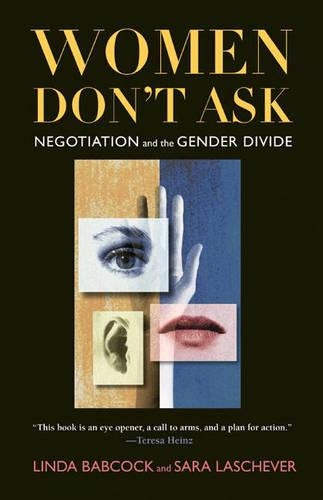
Women Don't Ask: Negotiation and the Gender Divide
(Hardback)
Available Formats
Publishing Details
Women Don't Ask: Negotiation and the Gender Divide
By (Author) Linda Babcock
By (author) Sara Laschever
Princeton University Press
Princeton University Press
1st December 2003
United States
Classifications
General
Non Fiction
Social discrimination and social justice
Business and Management
305.4
Commended for Independent Publisher Book Awards (Women's Issues) 2004
Physical Properties
Hardback
240
Width 152mm, Height 235mm
482g
Description
When Linda Babcock asked why so many male graduate students were teaching their own courses and most female students were assigned as assistants, her dean said: "More men ask. The women just don't ask." It turns out that whether they want higher salaries or more help at home, women often find it hard to ask. Sometimes they don't know that change is possible--they don't know that they can ask. Sometimes they fear that asking may damage a relationship. And sometimes they don't ask because they've learned that society can react badly to women asserting their own needs and desires. By looking at the barriers holding women back and the social forces constraining them, Women Don't Ask shows women how to reframe their interactions and more accurately evaluate their opportunities. It teaches them how to ask for what they want in ways that feel comfortable and possible, taking into account the impact of asking on their relationships. And it teaches all of us how to recognize the ways in which our institutions, child-rearing practices, and unspoken assumptions perpetuate inequalities--inequalities that are not only fundamentally unfair but also inefficient and economically unsound.With women's progress toward full economic and social equality stalled, women's lives becoming increasingly complex, and the structures of businesses changing, the ability to negotiate is no longer a luxury but a necessity. Drawing on research in psychology, sociology, economics, and organizational behavior as well as dozens of interviews with men and women from all walks of life, Women Don't Ask is the first book to identify the dramatic difference between men and women in their propensity to negotiate for what they want. It tells women how to ask, and why they should.
Reviews
Runner-Up for the IPPY Best Book Award for Women's Issues "Babcock and Laschever, contrary to their book's title, do ask a series of questions: Why do most women see a negotiation as an automatic fight instead of a chance to get what they deserve Why are women afraid to ask for what they deserve Why are women afraid to ask for what they want in the workplace And perhaps most importantly, why don't women feel entitled to ask for it... [A] great resource for anyone who doubts there is still a great disparity between the salary earnings of men and women in comparable professions"--Publishers Weekly "A highly readable book... Women Don't Ask should be read by anyone with a fear of negotiating, male or female, and by managers who want a better understanding of how 47 percent of the work force confronts the workplace."--Alan B. Krueger, The New York Times "Women Don't Ask is not a straight recitation of findings--nor is it simply a "rant." It goes beyond well-known facts and offers concrete tips on how women can remedy the underlying problems and actually move ahead. The authors prescribe refreshingly specific methods of negotiation that they've seen work for even the most confrontationally-challenged women."--Allison Nazarian, ForeWord Magazine "Neither a dry academic treatise nor a self-help book, this work puts forth a model for a society that respects women's communication strengths."--Library Journal "This thoughtful analysis could both benefit managers across industry lines and help women learn the importance of developing negotiating skills."--Booklist "Women Don't Ask offers important insights into the persistent economic gap between men and women."--Dolores Kong, Boston Globe "Clear, useful, and sensibly organized... Women Don't Ask crisply describes the results of one study after another, fitting the puzzle pieces together to show how and why women are held back--and hold themselves back--from advancing both financially and in every other way."--E.J. Graff, Women's Review of Books "The first book to adequately explain the dramatic differences in how men and women negotiate and why women so often fail to ask for what they want at work (starting with equal pay). Every male manager in America should read it."--Fortune
Author Bio
Linda Babcock is James M. Walton Professor of Economics at Carnegie Mellon University's H. John Heinz III School of Public Policy and Management. Sara Laschever is a writer whose work has been published by the "New York Times", the "New York Review of Books", the "Village Voice", "Vogue", and other publications.
